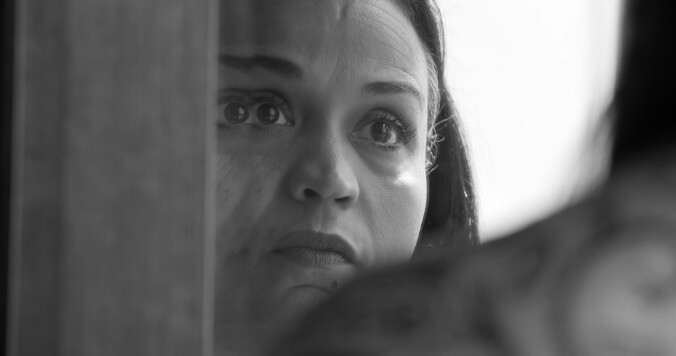features several scenes of a woman on hold, patiently waiting on the line for what will probably be bad news. She is Sibil “Fox” Rich, small business owner and self-proclaimed abolitionist, and for almost two decades, she’s been tirelessly lobbying for the release of her husband, Rob, who’s serving an abnormally long sentence at Angola, a.k.a. the Louisiana State Penitentiary. Fox’s crusade requires a lot of calls to the courthouse, and more than once, we’re plopped down next to her in her office, as she presses a phone against one ear and politely inquires about a decision she’s usually told—after a few minutes of dead air—the judge hasn’t made yet. Bradley isn’t there with her camera every time Fox makes the call—a task, we’re led to understand, that’s sometimes performed daily. But when she
there, the director makes sure to match her subject’s patience and just stay planted, letting the audience feel every pregnant second that elapses during this regular, dispiriting appointment with the cogs of legal bureaucracy. This is what the appeals process often looks like: waiting to learn that you’ll have to wait longer.
High-school sweethearts with aspirations to open a business in Shreveport, Louisiana, the Riches were in their early 20s when they made what they probably both consider the biggest mistake of their lives. Fox, who played getaway driver during an ill-fated armed robbery, served three-and-a-half years. But the judge threw the book at her husband, who caught an unforgiving 60 years, with no option for parole—an unusually draconian verdict. In the years after her release, Fox transformed her life, becoming a successful entrepreneur, raising six children, and devoting herself to prison reform, both through her tireless advocacy on Rob’s behalf and through speaking engagements where she commiserates with the families of the incarcerated and preaches on the injustices of the prison industrial complex.
Fox is a great documentary subject: impassioned, levelheaded in her determination, sometimes wryly funny. She has a politician’s poise and diplomacy, even when dealing with the roadblocks put in the way of her campaign for a reduced sentence. And when she’s on stage, it’s clear that she’s at once choosing her words carefully as an activist looking to inspire others like herself and exorcising a deeper, more personal rage about how her family has suffered from the machinations of a legal system historically stacked against Black men. Time could have worked perfectly well as just a vérité portrait of Fox Rich’s daily routines, balancing work, parenthood, and advocacy—which is, in fact, how this uncommonly lyrical documentary was originally conceived.
Yet Bradley takes a richer approach. During filming, she gained access to a treasure trove of archival footage: the home movies Fox shot for Rob over the previous two decades, a diary of their children growing up. True to its title, Time is very much about how we process the passing days, weeks, and years—a topic it tackles via an achronological structure that seems to collapse the past into the present. Rather than assemble a linear progression of events, Bradley jumps around the timeline, matching her own black-and-white imagery with Fox’s. Sometimes, these unannounced shifts create striking juxtapositions: The film cuts directly from footage of the couple’s twin boys in kindergarten to shots of them in high school—an expression of how quickly kids can seem to grow up, in a blink of the eye. Other times, Bradley and her editor, Gabriel Rhodes, identify changes in rhetoric and attitude, as when they move backwards from a particularly fiery speech by Fox to her more apologetic remarks in a church years earlier. Is the point here that she had to acknowledge and atone for her own mistakes—to ask for her family’s forgiveness, and perhaps forgive herself—before she could clearly the injustice of her husband’s situation?
Time is organized with a philosopher’s logic rather than an accountant’s. In opposition, perhaps, to the very system the Riches are battling, the film stubbornly refuses to become a legal drama; it’s less interested in cataloguing every up and down of Rob’s case than in exploring the emotional shifts Fox and her family have experienced over the years. The movie presents the uphill fight for an appealed sentence as a competition between idealism and pragmatism—the ability to perpetually lower your expectations without abandoning all hope. Fox, who’s devoted a lifetime of savings to the case, throws herself tirelessly into the legwork, into constant phone calls and paperwork; growing hardened to rejection without giving up, she clings to a faith that maybe borders on denial: “This wasn’t the year. Next year will be the year.” Even when she cracks a little—one conversation with a judge’s secretary, who admits that she has no news because she hasn’t checked for any, challenges her perpetual positivity—Fox always reverts to believing her efforts will pay off. It’s bittersweet, like the cardboard cutout of Rob they set up in the family home.
Bradley, who’s worked mainly in narrative cinema, lends a sharp eye for composition and a poet’s sensibility. This is a beautifully shot film that’s as interested in studying the changing faces of its subjects as laying out their struggle from end to end. Life intervenes in the story Time tells, providing it with the kind of dramatic closure that can turn a documentary into a word-of-mouth sensation. But it’s to the credit of Bradley’s more meditative concerns that even if that big ending didn’t arrive, the film would still look like an essential document of a crucible both personal and legal. What the film doesn’t and maybe can’t provide is Rob’s perspective—the way he experiences the passing decades in his own, much more restrictive purgatory of stasis. Still, you leave the movie with a greater understanding of what the Riches know in their bones: that time has been more than served on both sides of the bars.


